Today’s healthcare practices are inundated with data, encompassing everything from electronic health records to operational and financial metrics. The challenge lies in analyzing this immense amount of data to uncover actionable insights that can enhance clinical and administrative operations. Healthcare business intelligence (BI) addresses this challenge by transforming unprocessed data into strategic insights, driving healthcare practices toward greater operational efficiency and improved patient outcomes.
Understanding Healthcare Business Intelligence
Healthcare Business Intelligence encompasses a range of technologies, tools, and methodologies that facilitate the collection, integration, analysis, and presentation of business data. Within the healthcare sector, BI is utilized systematically to inform decision-making processes and enhance overall outcomes. The fundamental elements of BI include data gathering, thorough analysis, and comprehensive reporting.
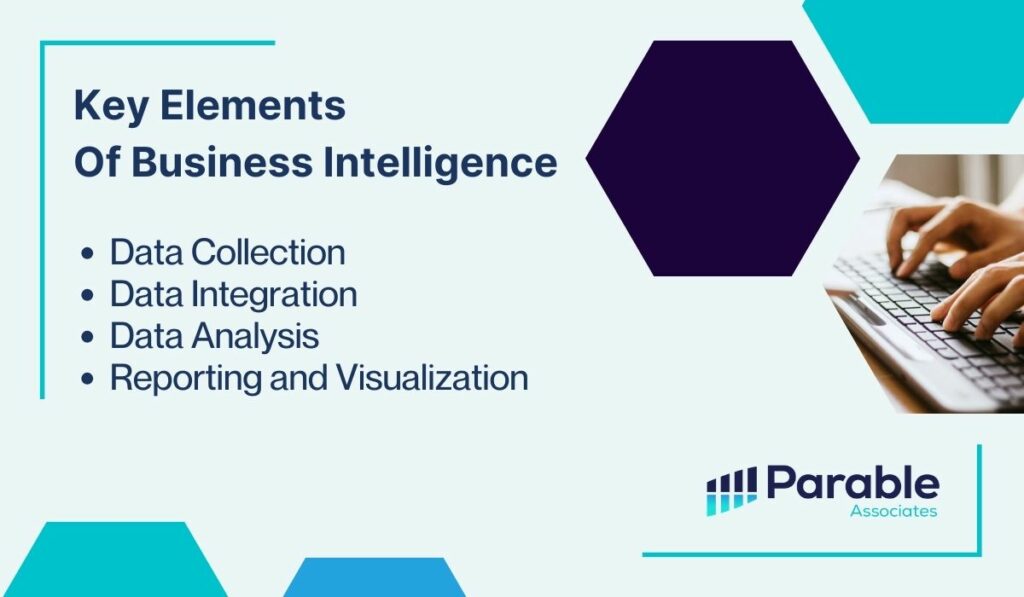
Data Collection
Data collection is the first step in the BI process, involving the gathering of information from various sources such as electronic health records (EHRs), patient management systems, and financial databases. This data can include everything from patient demographics and clinical histories to billing details and operational metrics. Effective data collection ensures that the information is accurate, comprehensive, and ready for further analysis.
Data Integration
Once data is collected, the next critical step is integration. This involves combining data from multiple sources into a cohesive and unified system. In healthcare, this might mean merging patient records from different departments, linking operational data with clinical outcomes, or connecting financial information with resource utilization statistics. Proper integration is crucial for ensuring that data is consistent and that insights derived from the analysis are reliable.
Data Analysis
Data analysis is where raw data is transformed into meaningful insights. Advanced analytics techniques, such as predictive analytics, machine learning, and statistical modeling, are applied to identify patterns, trends, and correlations within the data. For healthcare practices, this could identify areas for improvement in operational efficiency or the allocation of financial resources.
Reporting and Visualization
The final component of BI is reporting and visualization. This step involves presenting the analyzed data in a format that is easily understandable and actionable for decision-makers. Dashboards that contain charts, graphs, and detailed reports are commonly used to visualize data, allowing healthcare providers to quickly grasp insights and make informed decisions. Effective reporting ensures that key stakeholders can monitor performance, track progress toward goals, and identify areas for improvement.
Benefits of Healthcare BI
Healthcare business intelligence offers numerous benefits that can transform practice management. From improved patient care to increased profitability, BI can elevate your practice, setting it on a trajectory for growth.
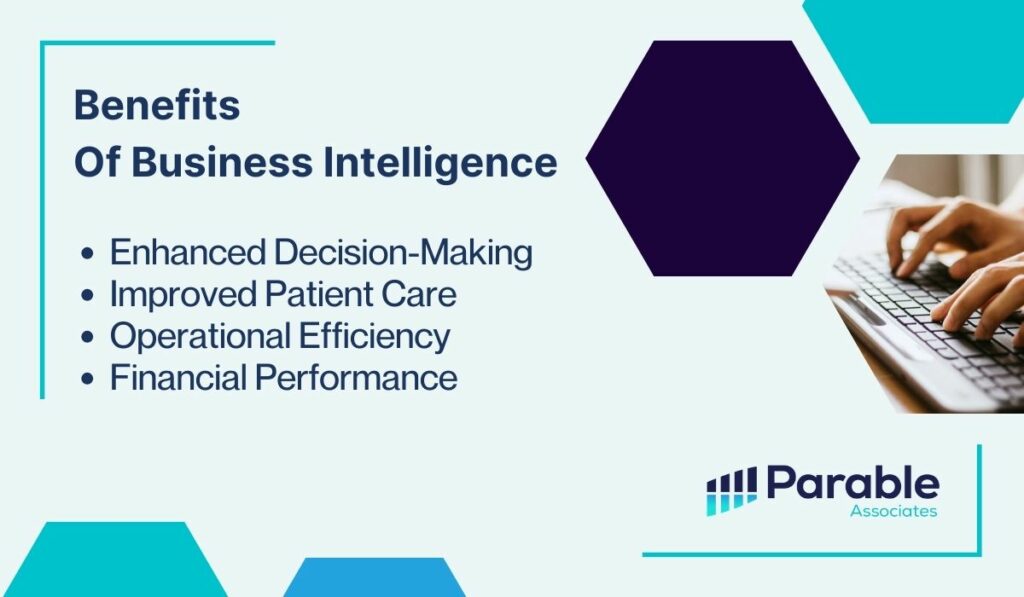
Enhanced Decision-Making
One of the primary benefits of BI is its ability to enhance decision-making. With real-time data access, healthcare providers can make informed decisions quickly. Predictive analytics, a vital aspect of BI, allows practices to foresee future trends and prepare accordingly. For instance, predictive analytics can forecast patient appointment rates, helping practices allocate resources efficiently and avoid overburdening staff during peak times.
Improved Patient Care
BI plays a significant role in improving patient care. By monitoring patient outcomes and treatment effectiveness, healthcare providers can tailor care plans to meet individual needs. Data-driven insights enable personalized patient care, leading to better health outcomes and increased patient satisfaction. For example, BI tools can track patient recovery rates, and adherence to treatment plans, and identify potential complications early, allowing for timely interventions.
Operational Efficiency
Operational efficiency is another area where healthcare business intelligence proves invaluable. BI tools streamline administrative processes, reducing the time spent on paperwork and manual data entry. This optimization frees up staff to focus on more critical tasks, enhancing overall productivity. Moreover, BI helps in optimizing resource allocation, ensuring that staff, equipment, and facilities are used effectively. For instance, BI can analyze appointment scheduling patterns to minimize wait times and avoid overbooking.
Financial Performance
Financial performance in healthcare is crucial for sustainability. The BI-enabled analysis of financial data aids in revenue cycle management and cost control by providing detailed insights into financial operations. It helps identify and reduce financial leakages, ensuring that every dollar spent contributes to the practice’s goals. BI tools can monitor billing processes, detect anomalies, and ensure accurate coding, thereby reducing the likelihood of claim denials and underpayments.
Key Areas of Impact
Healthcare business intelligence profoundly influences several core areas within a practice, driving improvements in both clinical and administrative functions. Here are some key areas where BI can make a significant impact.
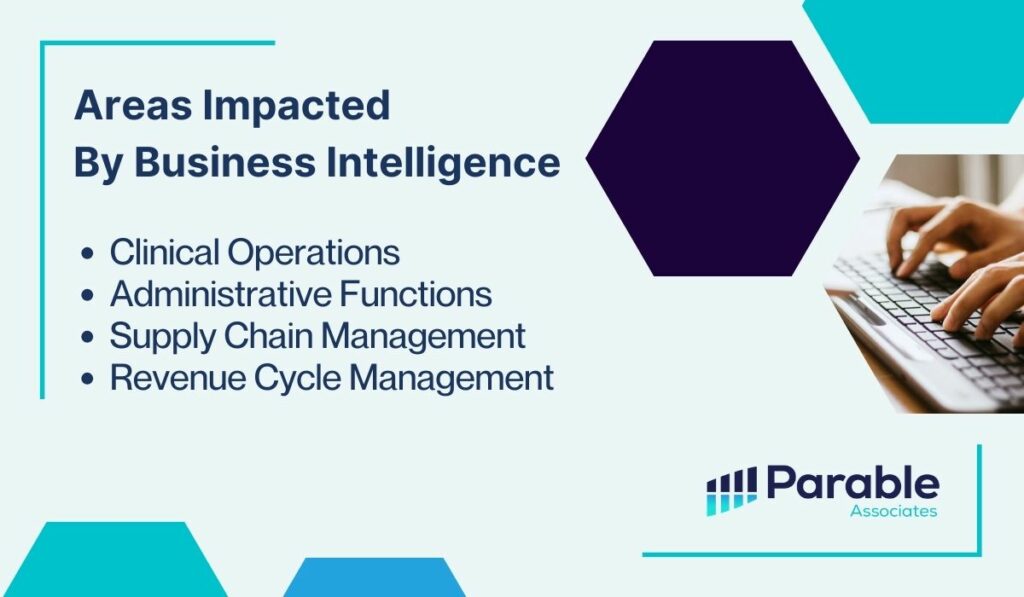
Clinical Operations
BI tracks performance metrics to enhance care coordination and patient management. By analyzing clinical data, practices can identify areas for improvement, streamline workflows, and ensure adherence to clinical guidelines. This data-driven approach leads to Improved care and better patient outcomes. For example, BI can help identify patterns in patient treatment responses, allowing clinicians to adjust therapies for better results.
Administrative Functions
Automation of routine administrative tasks leads to greater efficiency and fewer errors. BI tools can streamline the management of patient records, appointment schedules, and billing information seamlessly, allowing administrative staff to focus on enhancing patient experience and improving operational performance.
Supply Chain Management
Effective supply chain management is critical in healthcare to ensure the timely availability of supplies and reduce wastage. BI enables practices to manage inventory by providing accurate demand forecasts and tracking inventory levels. This proactive approach ensures that practices are well-stocked with necessary supplies while minimizing the costs associated with overstocking or shortages.
Revenue Cycle Management
Revenue cycle management involves the financial processes associated with billing, claim submission, and reimbursement. BI tools help improve the clean claim rate by identifying the root causes of denials and implementing corrective actions. This not only reduces revenue losses but also accelerates cash flow. For instance, BI can provide insights into payer performance and improve reimbursement rates.
Implementation of Healthcare BI
To achieve the maximum impact of business intelligence, proper implementation is critical. Without it, a practice can miss out on valuable insights to help improve operational performance and efficiency, thereby reducing their return on investment
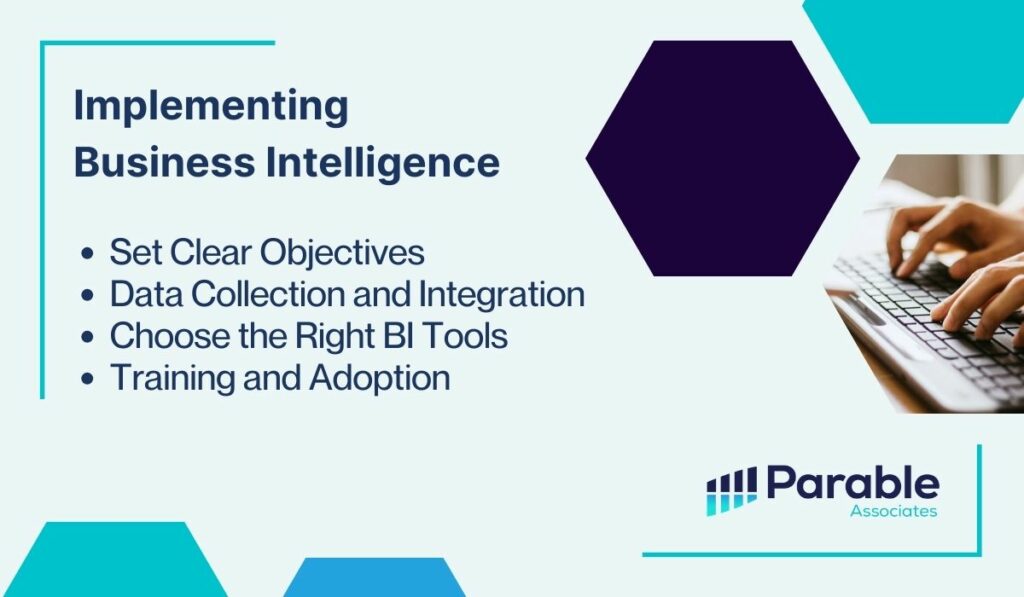
Setting Clear Objectives
Successful BI implementation starts with a discovery meeting to set clear objectives. Practices need to define what they hope to achieve with BI, whether it’s improving patient care, enhancing operational efficiency, or optimizing financial performance. Establishing measurable goals and identifying key performance indicators (KPIs) provides a roadmap for the BI project and ensures alignment with the practice’s strategic objectives.
Data Collection and Integration
Integrating data from various sources is essential for a comprehensive BI system. Healthcare practices typically have data spread across electronic health records, billing systems, and other software applications. Ensuring data quality and consistency is vital for accurate analysis. BI tools must be capable of seamlessly integrating these diverse data sources to provide a holistic view of the practice’s operations.
Choosing the Right BI Tools
Selecting the appropriate BI tools is crucial for effective implementation. Practices should evaluate different BI platforms based on factors like user-friendliness, scalability, and cost. The chosen tool should align with the practice’s needs and capabilities. User-friendly interfaces, support features, and the ability to customize are essential to encourage adoption among staff and ensure long-term success.
Training and Adoption
Training is a critical component of BI implementation. Staff must be trained to use BI tools effectively to realize their full potential. This includes understanding how to generate reports, interpret data, and apply insights to decision-making. Promoting a data-driven culture within the organization fosters widespread adoption and ensures that BI becomes an integral part of daily operations.
Challenges in Healthcare BI
Implementing healthcare business intelligence comes with its own set of challenges. Addressing these issues is essential for ensuring the successful integration and utilization of BI tools in healthcare practices.
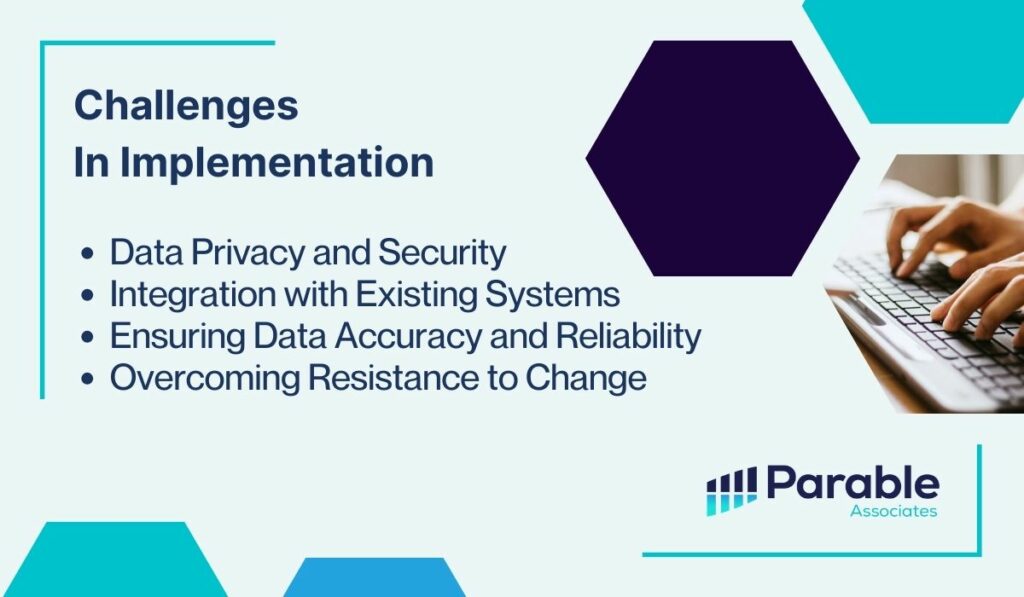
Data Privacy and Security
Ensuring the privacy and security of data is critical in healthcare. Implementing BI systems involves handling sensitive patient information that must be safeguarded against breaches and unauthorized access. To maintain data integrity, practices need to ensure their BI systems comply with relevant regulations and implement robust security measures.
Integration with Existing Systems
Integrating BI tools with existing systems can be challenging. Compatibility issues and data silos can hinder seamless integration. Practices need to ensure that their BI solutions can work harmoniously with the current IT infrastructure and that data flows smoothly across all platforms.
Ensuring Data Accuracy and Reliability
The accuracy and reliability of data are fundamental to BI success. Inaccurate or inconsistent data can lead to erroneous insights and poor decision-making. Practices must implement rigorous data validation and cleansing processes to maintain high data quality.
Overcoming Resistance to Change
Adopting new technologies can be met with resistance from staff accustomed to traditional methods. It is essential to address concerns, provide adequate training, and highlight the benefits of BI to encourage acceptance and utilization.

Parable Associates – Your Partner in Healthcare Business Intelligence
Healthcare Business Intelligence is a powerful tool that can enhance decision-making, improve patient care, streamline operations, and optimize financial performance. Parable Associates specializes in implementing BII solutions tailored specifically for healthcare practices. Our expertise in data integration, analytics, and user training ensures that your practice can fully leverage the power of business intelligence. By partnering with us, healthcare practices can unlock the potential of their data, leading to improved operational efficiency and financial performance. Choose Parable Associates for a comprehensive, customized approach to healthcare business intelligence. Schedule a discovery call today.
Healthcare Business Intelligence FAQs
Healthcare BI uses data analytics to transform healthcare data into actionable insights. This can improve patient care, streamline operations, and boost financial performance.
BI automates tasks and streamlines workflows, freeing up staff for more important tasks. It also helps manage patient records, appointments, and billing, leading to greater efficiency and fewer errors.
BI tools can identify the root causes of billing denials and improve the clean claim rate. This reduces revenue losses and accelerates cash flow. Additionally, BI provides insights into payer performance to potentially improve reimbursement rates.
Challenges include ensuring data privacy and security, integrating BI with existing systems, maintaining data accuracy, and overcoming staff resistance to change.
Healthcare BI implementation requires careful planning and execution. While the technology itself can be user-friendly, factors like data integration and staff training need to be addressed. Partnering with a healthcare BI specialist can simplify the process and ensure successful implementation.
Parable Associates brings a unique focus to healthcare BI. Unlike general BI providers, we specialize in the complexities of the healthcare industry. Our team understands the specific challenges faced by healthcare practices and can tailor BI solutions to address your unique needs. Schedule a discovery call today.

